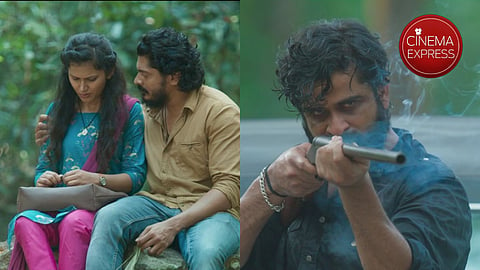Jungle Mangal Movie Review — A forest thriller fueled by strong performances
Jungle Mangal(3 / 5)
In Jungle Mangal, director Rakshit Kumar presents a sprawling emotional thriller layered with romance, betrayal, and a dense, near-mythical sense of place. Set against the lush yet isolating backdrop of the Western Ghats, the film weaves a tangled narrative of relationships strained by lockdown, generational guilt, patriarchal pressure, and a gun mystery.
The story opens in a quiet village under COVID-19 lockdown, as safety announcements play on TV. At the story’s core is Divya (Harshitha Ramachandra), fondly called Ammi, the eldest of four daughters to Santhappa, a man quietly grieving the absence of a male heir, a sorrow he shares with his friend and relative, Jagga (Balawadi Raju).
Director: Rakshit Kumar
Cast: Yash Shetty, Harshitha Ramachandra, Uggram Manju, Bala Rajawadi, and Deepak Rai Panaje
What’s currently troubling Ammi is her relationship with Praveen (Yash Shetty), a man left jobless by the pandemic. Their short escape into the wilderness, meant to reclaim something lost, instead spirals into a nightmare.
The film’s structure leans on nonlinear storytelling, intercutting present-day tension with glimpses of the past. This back-and-forth approach deepens the emotional stakes but occasionally muddles character motivations. It’s a complex device that reveals crucial truths slowly, sometimes a little too slowly.
A standout antagonist emerges in Babu aka Babanna (Ugramm Manju), a self-proclaimed guardian of the forest. Obsessed with Ammi and bittered by past wounds, Babu operates on a disturbing mix of entitlement and delusion. When Ammi later encounters him alone in the woods, the film’s tone shifts from suspenseful to surreal, hinting at deeper mythical undertones. Babu has many enemies, one of them being Jagga. But ultimately, who falls prey, and how a gun becomes a turning point, form the rest of the story.
What works best in Jungle Mangal is its character-driven core. The performances are deeply committed. The emotional anxiety of a woman caught between loyalty, fear, and familial pressure is portrayed with restraint by Harshitha Ramachandra, while the men in her orbit—Yash Shetty, Bala Rajawadi, and Ugramm Manju, among others—swing between desperation, dominance, and delusion.
Cinematographer Vishnu Prasad P captures the Western Ghats not just as a setting but as a spirit; the jungle is both breathtaking and claustrophobic, which brings forth the emotional entrapments faced by the characters. Certain sequences shimmer with dread, transforming serenity into suffocation.
The film resists loud melodrama. Instead, it builds slow, steady tension, supported by an evocative score by Poornachandra Tejaswi and Prasad K Shetty, and grounded production design. It closes not with spectacle, but with quiet devastation, choosing emotional truth over shock value.
Despite occasional structural indulgences and pacing dips, Jungle Mangal succeeds in what it sets out to do: tell a rooted story about love, pressure, and entrapment. It’s not just about a couple lost in a jungle—it’s about every woman lost in the wilderness of expectation, inheritance, and male obsession.

